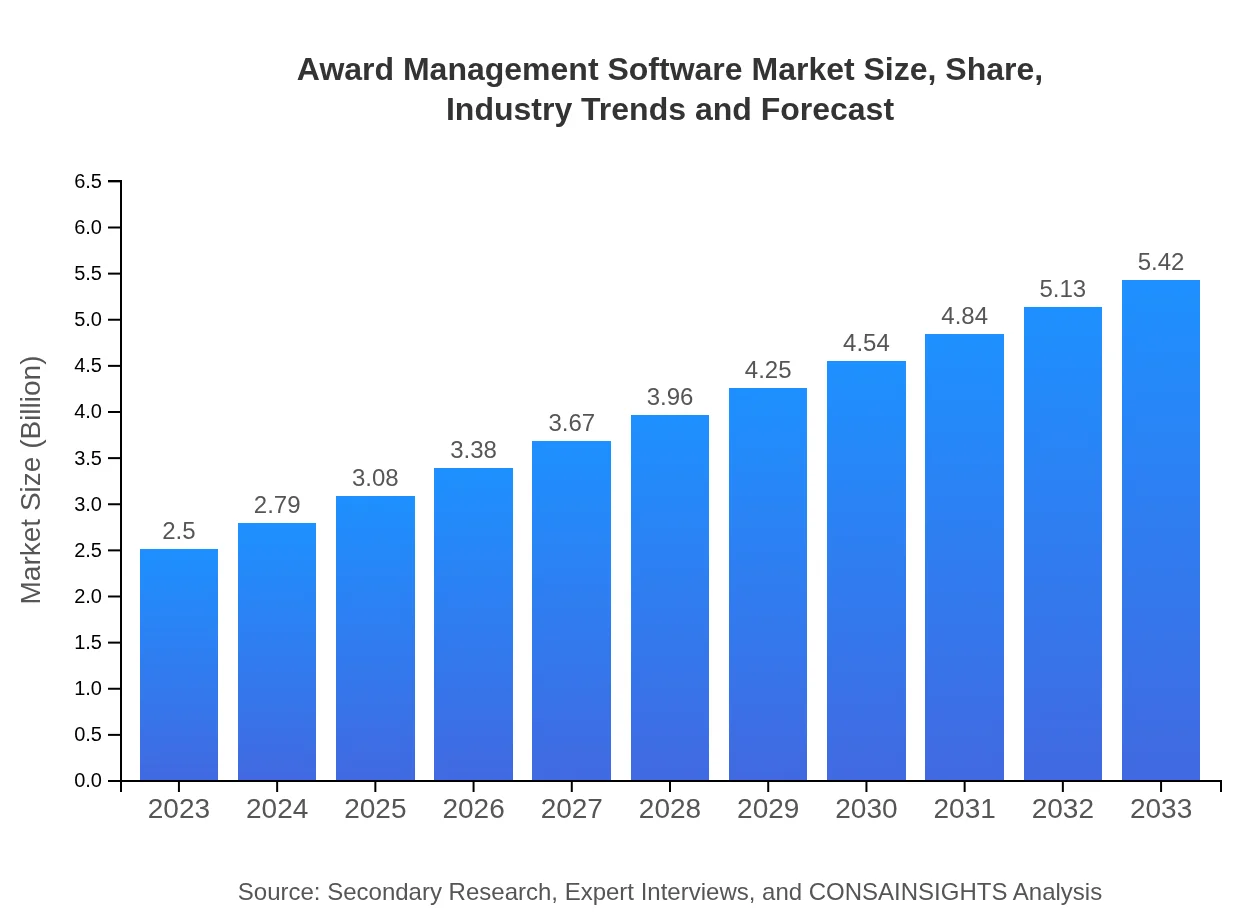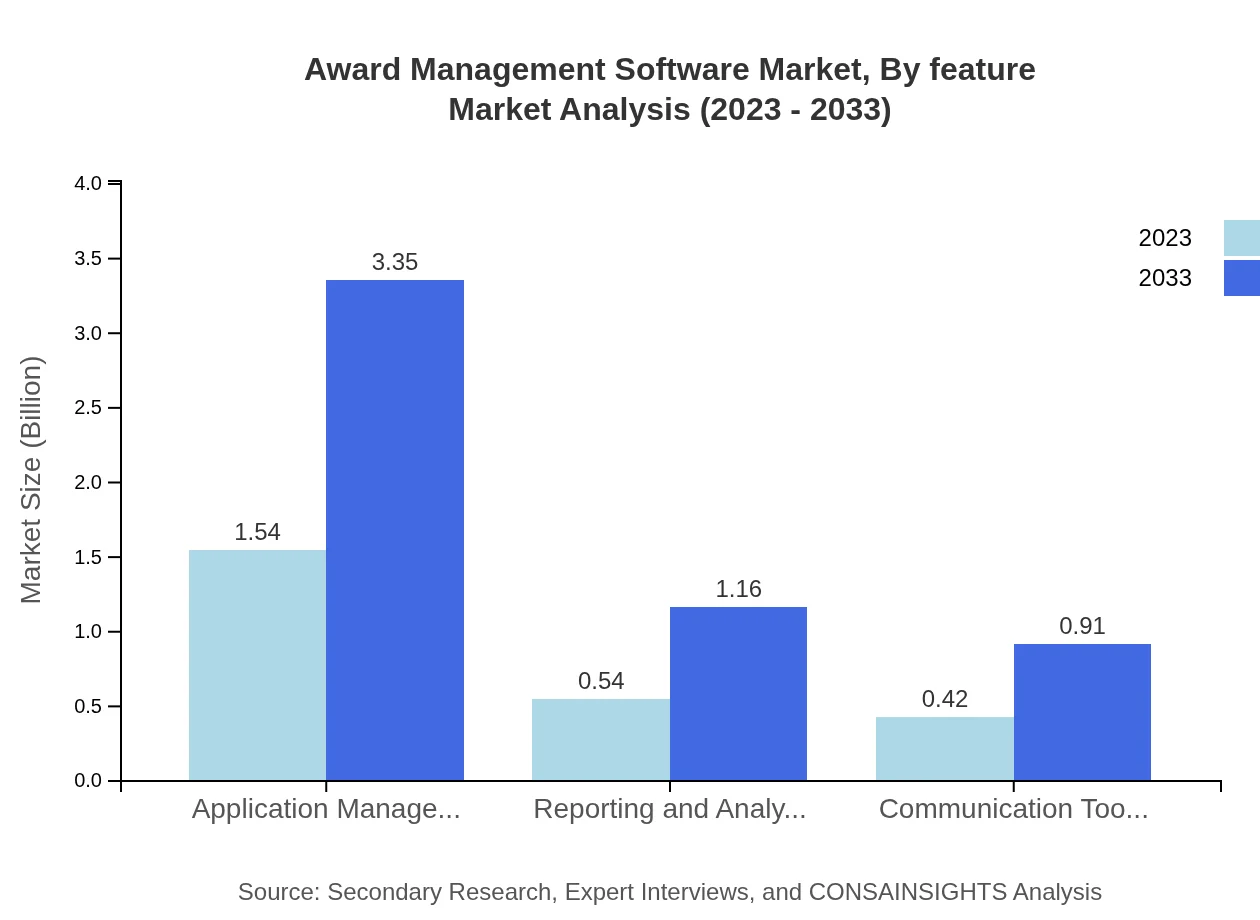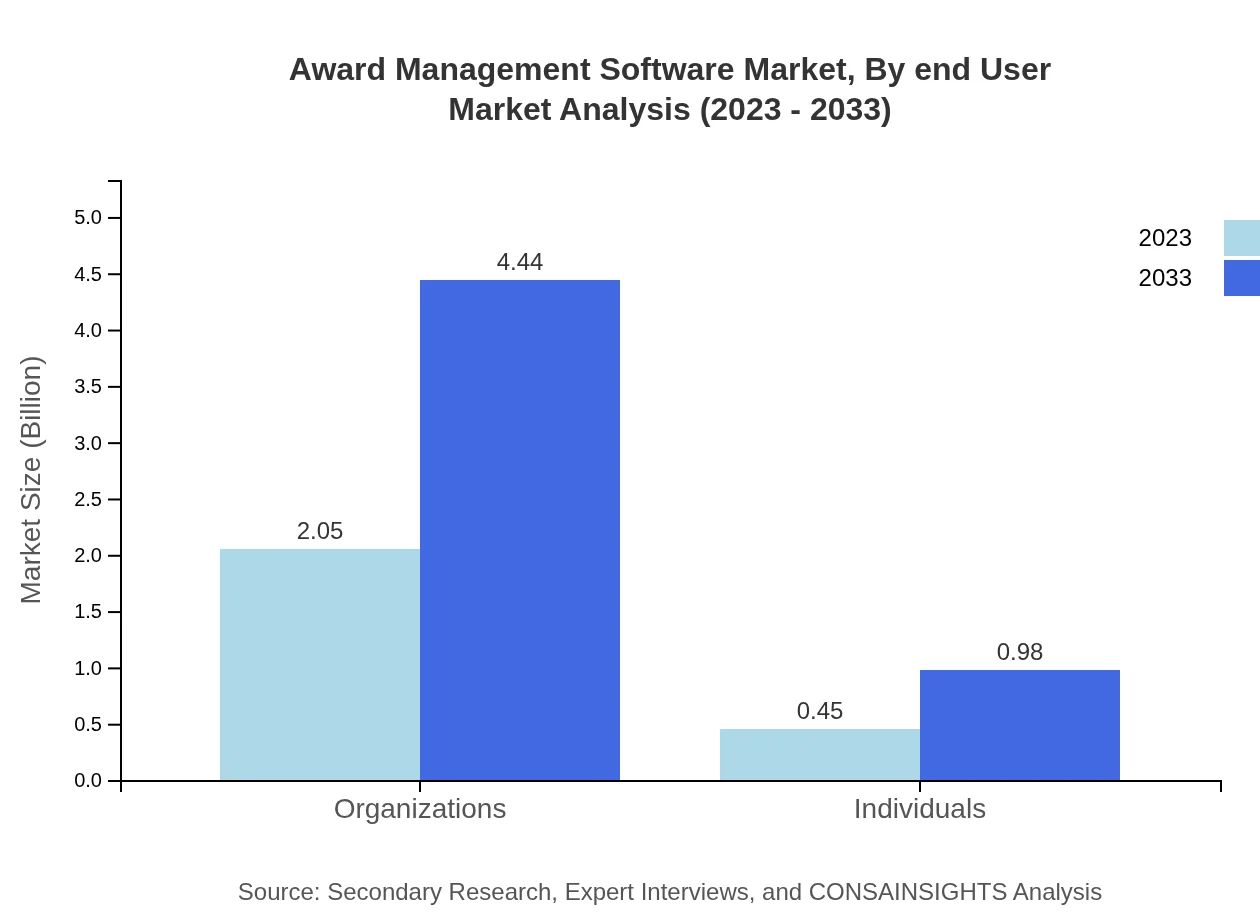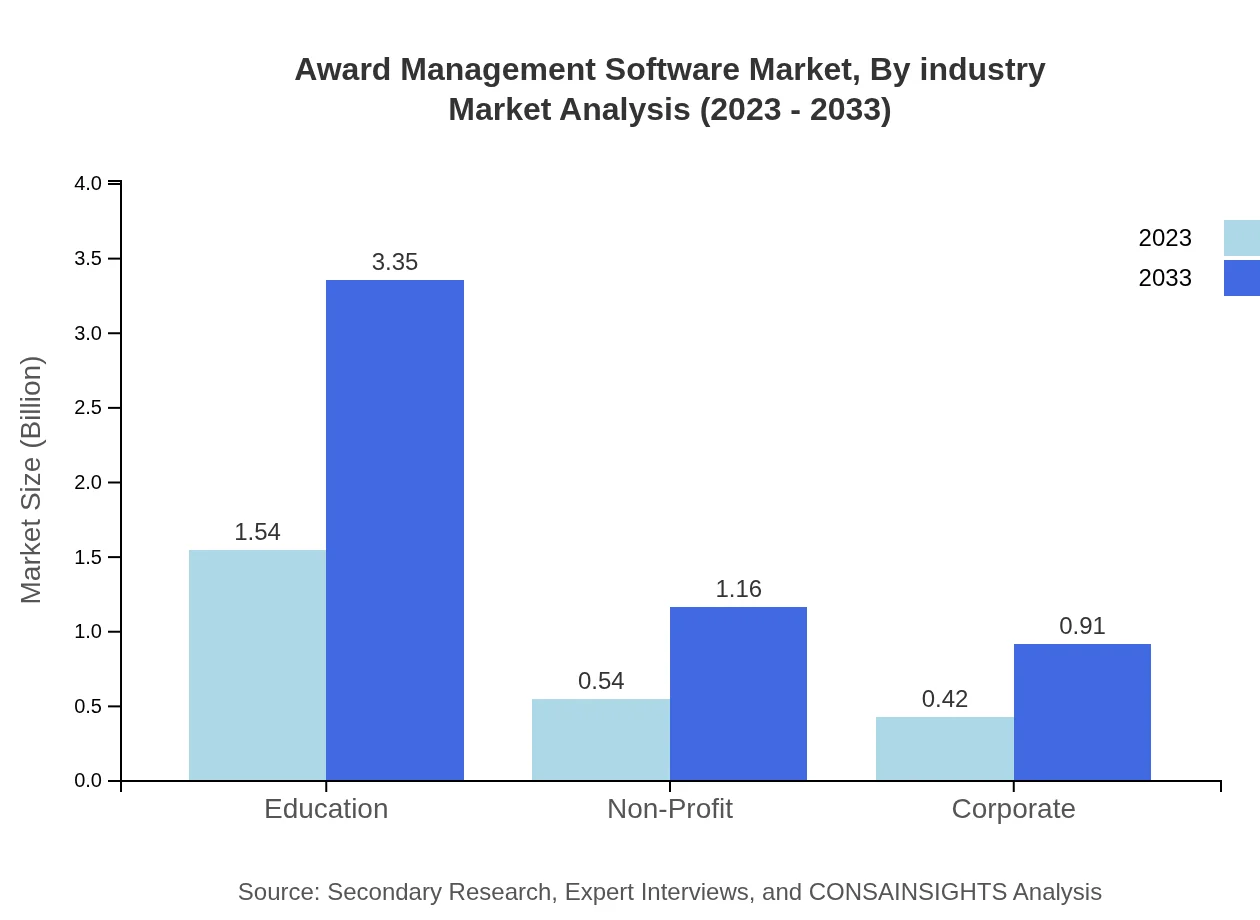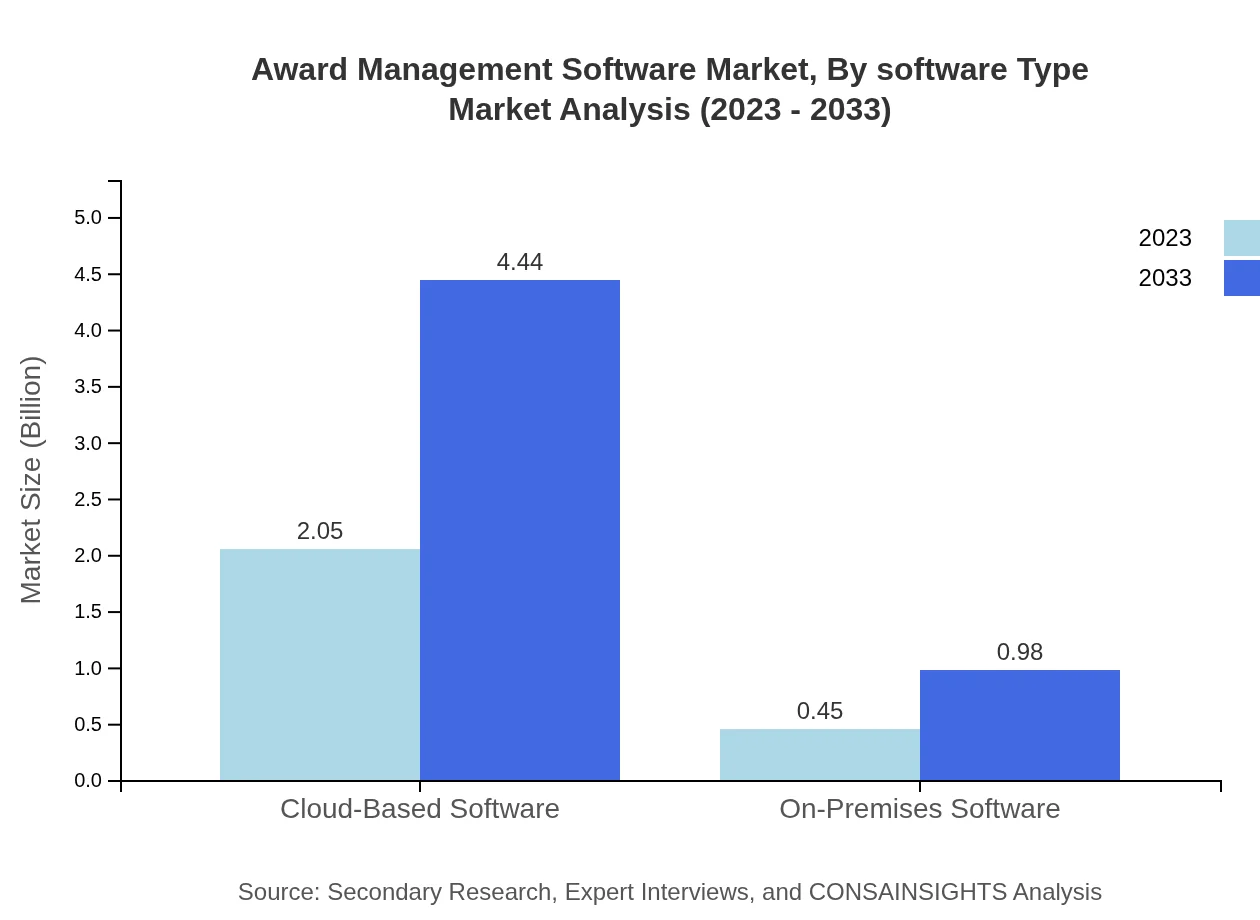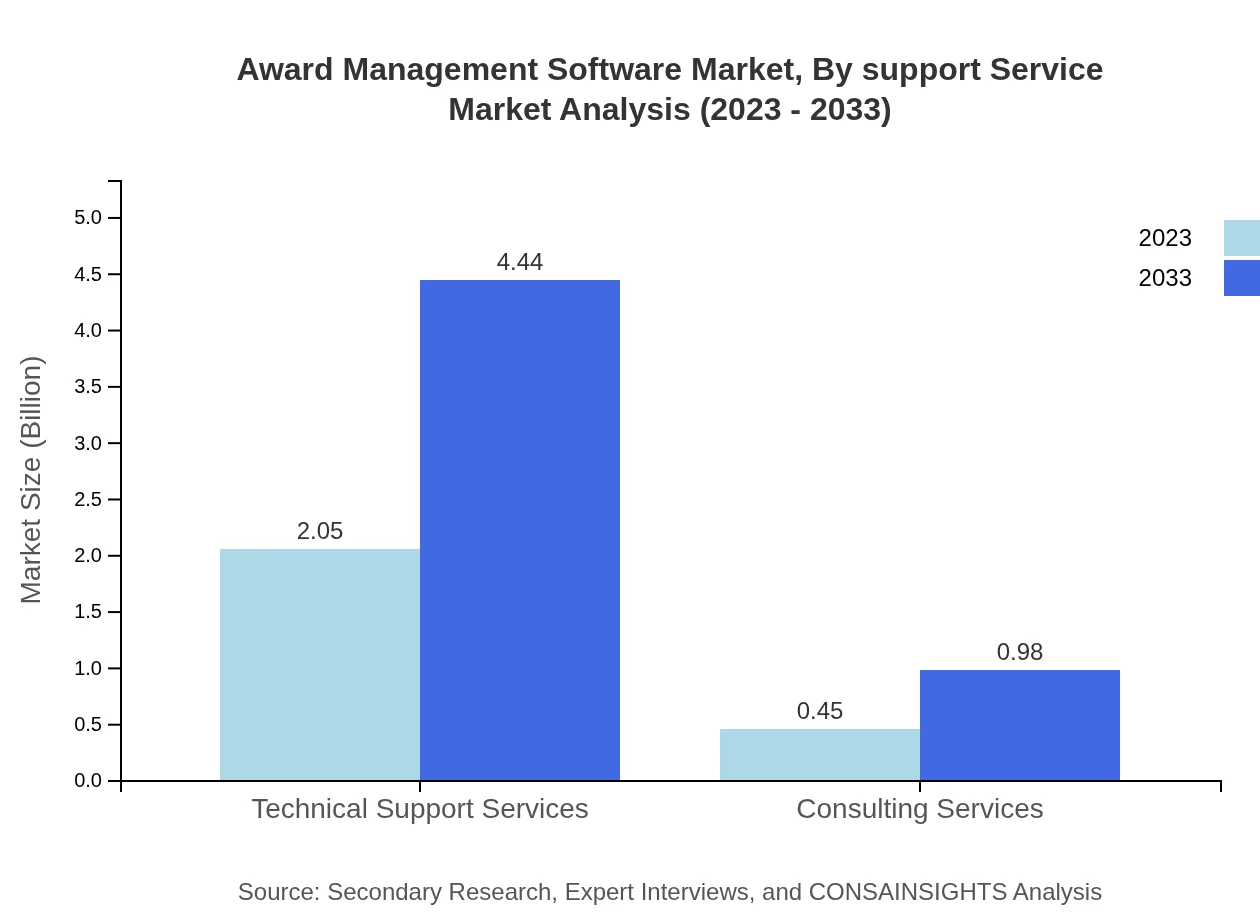Award Management Software Market Report
Published Date: 31 January 2026 | Report Code: award-management-software
Award Management Software Market Size, Share, Industry Trends and Forecast to 2033
This report provides an in-depth analysis of the Award Management Software market, covering its current status, future forecasts (2023-2033), market trends, regional insights, and key players. It aims to provide valuable data and insights to stakeholders looking to understand the market dynamics better.
| Metric | Value |
|---|---|
| Study Period | 2023 - 2033 |
| 2023 Market Size | $2.50 Billion |
| CAGR (2023-2033) | 7.8% |
| 2033 Market Size | $5.42 Billion |
| Top Companies | Submittable, Award Force, FluidReview |
| Last Modified Date | 31 January 2026 |
Award Management Software Market Overview
Customize Award Management Software Market Report market research report
- ✔ Get in-depth analysis of Award Management Software market size, growth, and forecasts.
- ✔ Understand Award Management Software's regional dynamics and industry-specific trends.
- ✔ Identify potential applications, end-user demand, and growth segments in Award Management Software
What is the Market Size & CAGR of Award Management Software market in 2023?
Award Management Software Industry Analysis
Award Management Software Market Segmentation and Scope
Tell us your focus area and get a customized research report.
Award Management Software Market Analysis Report by Region
Europe Award Management Software Market Report:
Europe's market is also on a growth trajectory, rising from $0.67 billion in 2023 to $1.45 billion by 2033. The region benefits from a high density of corporate entities that recognize and reward talents, fostering a thriving market for management software.Asia Pacific Award Management Software Market Report:
The Asia Pacific market for Award Management Software is projected to reach $1.08 billion by 2033, up from $0.50 billion in 2023. This increase is fueled by the rapid digital transformation across various industries in the region and growing emphasis on recognition and talent management processes.North America Award Management Software Market Report:
North America is anticipated to witness substantial growth, with market size escalating from $0.92 billion in 2023 to an impressive $2.00 billion by 2033. The region leads in technological innovations and adoptions, making it a hotbed for award management solutions, especially in corporate and educational use.South America Award Management Software Market Report:
In South America, the award management software market is expected to grow from $0.13 billion in 2023 to $0.27 billion by 2033. Increasing investments in education and corporate sectors to adopt more structured award management systems are driving this growth.Middle East & Africa Award Management Software Market Report:
The Middle East and Africa segment is expected to grow from $0.28 billion in 2023 to $0.62 billion by 2033. An increasing focus on improving employee engagement and organizational culture is pushing businesses towards adopting award management systems.Tell us your focus area and get a customized research report.
Award Management Software Market Analysis By Feature
In 2023, Application Management Features dominate the market with a size of $1.54 billion, representing 61.73% share. Reporting and Analytics Features also accounted for $0.54 billion (21.42% share), and Communication Tools contributed $0.42 billion (16.85% share). By 2033, the Application Management Features market will reach $3.35 billion while maintaining its share, whereas Reporting and Analytics features will grow to $1.16 billion, and Communication Tools are projected to reach $0.91 billion.
Award Management Software Market Analysis By End User
Organizations hold the largest market share at 81.87% with a size of $2.05 billion in 2023, projected to grow to $4.44 billion in 2033. Individuals, accounting for 18.13%, follow with a size of $0.45 billion, set to reach $0.98 billion by 2033. This trend indicates a stronger focus from organizations on acknowledging their talent through structured programs.
Award Management Software Market Analysis By Industry
The Education sector is a significant portion of the market with a size of $1.54 billion in 2023 (61.73% share). It is expected to grow to $3.35 billion by 2033. Non-Profit organizations also play a key role with their market size of $0.54 billion (21.42%), likely to rise to $1.16 billion, while Corporates represent $0.42 billion (16.85%) and are projected to grow to $0.91 billion.
Award Management Software Market Analysis By Software Type
Cloud-Based Software has a dominating market size at $2.05 billion (81.87% share) in 2023, scaling to $4.44 billion by 2033. Meanwhile, On-Premises Software is positioned at $0.45 billion (18.13%), expected to rise gradually to $0.98 billion.
Award Management Software Market Analysis By Support Service
Technical Support Services hold a significant market position at $2.05 billion in 2023 (81.87% share), expected to multiply to $4.44 billion by 2033. Consulting Services also contribute with a size of $0.45 billion (18.13%), predicted to advance to $0.98 billion.
Award Management Software Market Trends and Future Forecast
Tell us your focus area and get a customized research report.
Global Market Leaders and Top Companies in Award Management Software Industry
Submittable:
Submittable is a leading platform that enhances the award management process by allowing organizations to collect submissions, manage workflows, and communicate seamlessly with applicants.Award Force:
Award Force provides sophisticated solutions that streamline the awards management process, combining innovative technology with user-friendly features tailored to various organizational needs.FluidReview:
FluidReview specializes in award management software that enables organizations to easily manage and evaluate applications, facilitating a transparent and efficient selection process.We're grateful to work with incredible clients.









FAQs
What is the market size of award Management Software?
The award management software market is projected to be valued at $2.5 billion in 2023, with a compound annual growth rate (CAGR) of 7.8%. This growth reflects increasing demand for effective management solutions across various sectors.
What are the key market players or companies in this award Management Software industry?
Key players in the award management software industry include major companies such as Blackbaud, A Plus Funding, and Submittable, each providing tailored solutions to enhance the management of awards and grants, contributing significantly to market innovation.
What are the primary factors driving the growth in the award Management Software industry?
Driving factors for growth in the award management software industry include the rising need for transparency in grant management, increased adoption of digital solutions by organizations, and a surge in funding opportunities requiring effective management tools.
Which region is the fastest Growing in the award Management Software?
North America is the fastest-growing region in the award management software market, expected to grow from $0.92 billion in 2023 to $2.00 billion by 2033, indicating a strong trend towards advanced management solutions in the region.
Does ConsaInsights provide customized market report data for the award Management Software industry?
Yes, ConsaInsights offers customized market report data tailored to the award management software industry, allowing organizations to gain insights relevant to their specific needs and strategic objectives.
What deliverables can I expect from this award Management Software market research project?
Deliverables from this market research project will include comprehensive reports detailing market size, growth forecasts, competitive landscape analyses, and insights into industry trends and consumer preferences.
What are the market trends of award Management Software?
Current market trends in the award management software industry include the increasing shift towards cloud-based solutions, growing significance of data analytics in decision-making, and enhanced functionalities catering to non-profit and educational organizations.

